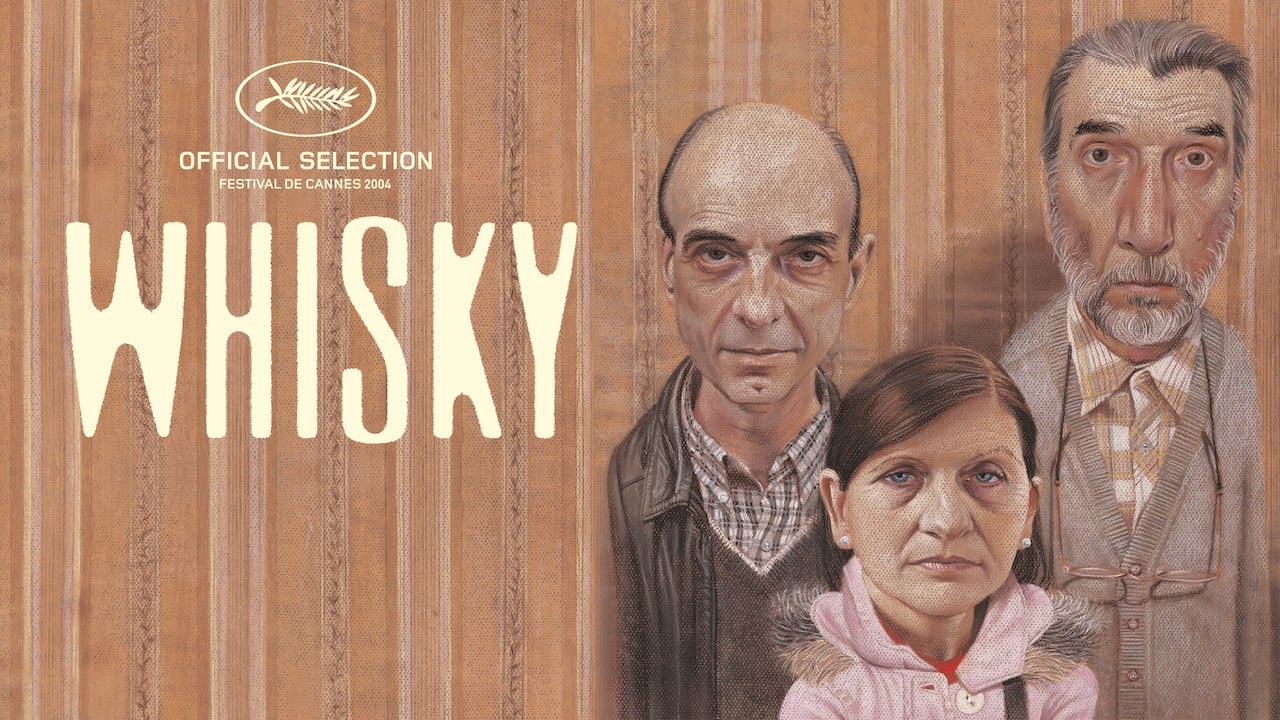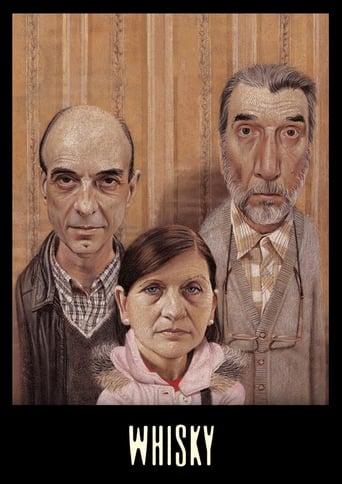



It's no definitive masterpiece but it's damn close.
View MoreThe movie's neither hopeful in contrived ways, nor hopeless in different contrived ways. Somehow it manages to be wonderful
View MoreThe thing I enjoyed most about the film is the fact that it doesn't shy away from being a super-sized-cliche;
View MoreA clunky actioner with a handful of cool moments.
This droll, deadpan comedy from Uruguay, clearly influenced by directors such as Jarmusch and Kaurismaki, is a real find. Directors Rebella (who killed himself shortly after this film was released) and Stoll, tell the story of two middle aged Jewish brothers. The elder brother has remained in Uruguay, running a decrepit sock factory, and acts taciturn and resentful, feeling life has cheated on him. The younger, more easy going brother, has moved to Brazil, where he has raised a family and runs a successful textile factory in the Sao Paulo area. When their mother dies, the brother in Brazil returns to Uruguay for the funeral. So that his younger brother will not pity him, his older brethren asks a middle aged, somewhat plump employee to pretend to be with his wife when his brother returns (this plot point is not really very believable, but in the cinema you sort of accept it). There is little else plot wise to the movie, as the brothers and the fake wife tour some of the deserted, sunless beaches of Uruguay to kill time and to get acquainted (or reacquainted) with each other as well as to settle past scores. To those that thing South America is everywhere a tropical and exotic place, they might be surprised to see a movie that is somewhat reminiscent of the old Eastern Bloc movies (Uruguay is well to the south of the tropics, its climate is temperate, and is the least typically south American of Spanish speaking nations in the continent). In a way, this movie might be also be a metaphor of Uruguay, once a country that was called the Switzerland of South America for its democracy and progressivism, but that in the last few decades has seen nasty military dictatorships, and some of its infrastructure and social capital run down. Worth seeing and quite moving.
View MoreI recently saw this masterpiece of Latin American cinema. I've always taught that you don't need a big budget to make a big movie. Great movies relay on a great message, a solid statement. On this particular case "Whisky" from the beginning makes a point through its own images and pace. The viewer gets immersed in a routine, a horrible way of life of the main character (Jacobo Koller) that consists of living with no ambition, owning a horrible sock factory and going home with nothing... not a smile, not a desire, nothing, just the same routine over and over again. At the beginning when we see the same shots over and over, it seems like the movie is insisting upon itself, but is too important to state the point of the routine. We, as viewers get tired of watching this terrible life, imagine what it would be to live this life. When the main characters brother (Herman Koller) comes to Uruguay (a far more successful,and younger brother, that lives in Brazil), Jacobo asks Marta (an employee of his) to pretend she's his wife, probably to avoid criticism from his brother and to bare his brother's trip to Uruguay with someone else. Marta has the same features as Jacobo she lives a life of routine, with no surprises, nothing to take her out of her boredom. She's shy, and retrieved within herself, there will be a couple of scenes when we can see that probably Marta has been like this since she was a girl. Her relationship with Herman grows, she's in movement she wants something new. As for Jacobo he doesn't feel anything for life he's pessimistic, stubborn, a man with no dreams. The movie invites us to review our own life, are we going in a direction of routine and boredom? or are we looking for something new? Sometimes we can find that breath of life in the smallest of places, in the most unconventional of places, a book, a movie, a song, a trip, a person anything can give us something to live. Marta surely received that breath, and we all can.
View MoreFollowing the more crowd-pleasing blockbusting antics of the likes of City of God and Amores Perros, it came as quite a surprise for this quieter, more restrained example of Latin cinema to perform so well on the 2004 international festival circuit.The Uruguayan directors Pablo Stoll and Juan Pablo Rebella, following their previous effort 25 Watts (2001), once again centre their story in the small, provincial town of Montevideo. Jacobo Koller owns a modest sock factory that employs a few local women, including Marta. A year after his mother's death, his successful businessman brother Hermann visits from Brazil to attend the memorial. Jacobo requests that Marta pretends to be his wife while his brother stays. After the ceremony, the three take an impromptu trip to a small seaside resort.While this premise may sound overly familiar from a million-and-one lightweight US sitcoms, the delivery is never short of fresh and intriguing. It rarely approaches the sort of twee sentimentality we might expect after reading a short synopsis. Almost nothing is said for the first half of the film as we observe the characters' drab, innocuous lives. And yet, despite this, the film somehow succeeds in upholding a surprisingly light and comic atmosphere. There are genuine moments of deadpan humour. The actors (schooled in the reticence of the national theatre) never force the comedy, in fact it is more often the camera that delivers the punchline; the constant repetition and rituals, the framing of the lanky Jacobo and squat Marta and a sudden romantic karaoke sequence that is all the more touching for its spontaneity.Like the titular drink, Whisky is warm, satisfying and definitely suitable for repeat viewings.
View MoreDroll, understated comedy that also works as an allegorical account of the general state of affairs in Uruguay these days. Jacobo Köller (Andres Pazos) runs a small, down at the heels sock factory in Montevideo. He's an avoidant, depressive, aging bachelor who had taken care of his ailing mother for years until her recent death.Now it is time for her Matzeivah (a ceremony at which a tombstone is placed on her grave), and Jacobo is obliged to invite his younger brother Herman (Jorge Bolani), who moved north years earlier to Brazil, where he has a wife and family and runs a highly successful sock factory.For reasons never made clear, Jacobo feels he must pretend to be recently married. He imposes on the long suffering Marta (Mirella Pascual), who is his forewoman at the sock factory, to act the role of his spouse.Set against the mind-numbing routines of Jacobo and Marta's dull lives, Herman arrives like a Spring breeze. He's energetic, upbeat, full of corny jokes, even vaguely seductive toward Marta. At his insistence, the trio venture on hour east for a couple of days to the seaside resort of Piriapolis, on the so-called Uruguayan Riviera.Like the run down neighborhood, household and factory inhabited by Jacobo, Piriapolis has also seen better days. The threesome represent about half the audience at a pathetic nightclub where the lead singer is a 12 year old. The only other guests at the hotel seem to be a hick couple of honeymooners from the sticks.Near the end of his visit, Herman gives Jacobo an envelope of cash, guilt money to make up for never having helped care for their mother himself. He urges Jacobo to replace his out of date sock making machines. Jacobo instead tries to blow it all in the casino but fails: in fact, he wins big! Not too many years ago Uruguay was a thriving, economically successful nation, but, not unlike Jacobo and his shabby factory, messy apartment and old car that won't start, it's a place that has fallen on hard times, while its larger neighbors Argentina to the west and Brazil to the north (represented by Herman), have, relatively speaking, become vibrant economic giants. The film does portray this larger surround in which the characters work out their individual destinies."Whisky," by the way, is the word that the photographers ask the somber Jacobo and Marta to say to evoke grins for their "wedding" picture, like our proverbial "cheese." "Whisky" is one of 10 recent films from developing nations touring in the "Global Lens 2005" series. (In Spanish) My rating: 7/10 (B). (Seen on 04/02/05). If you'd like to read more of my reviews, send me a message for directions to my websites.
View More